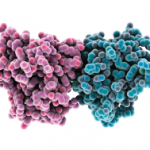Toll-like receptors play an important role in host defense. TLR-7 recognizes viral ssRNA, but also plays a role in the development of systemic lupus erythematosus (SLE). Genetic ablation of a similar receptor, TLR-9, results in opposite effects, with severe disease and kidney involvement. The mechanism of how this works remains unknown. Anna-Marie Fairhurst, PhD, from…


